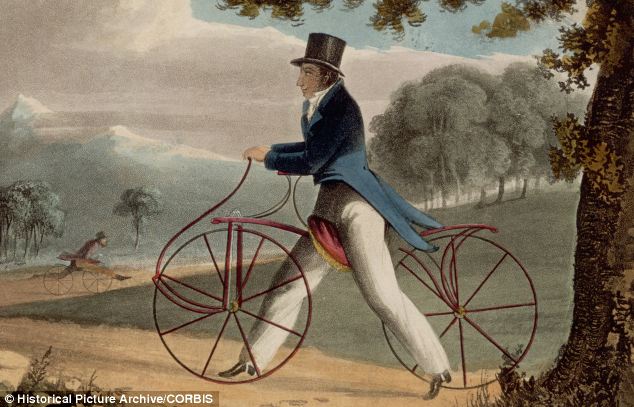What if the Automobile had come first?
 Mon, November 26, 2018
Mon, November 26, 2018 
What if the bicycle had never been invented in the late 1800s, would engineers come up with a similar design today? Even if they did, I doubt it would be taken seriously as a viable form of personal transport.
The bicycle came into being at a time when the only other form of personal transport was the horse. These animals were not only expensive to buy, they needed feeding and housing. Working class people could not afford horses.
However, once the bicycle had been invented, and a few years later mass production put this new machine within reach of the poorer classes it became a revolutionary form of personal transport. Many forget that the automobile came later and eventually replaced the horse as the wealthy person’s transport of choice.
I often wonder, what if the automobile had come first? The poorer working classes would have continued living in cities where they could get to work either on foot or by rail or other form of public transport.
The bicycle had less of an impact on America’s history, because in the US it was the automobile that became affordable due to mass production, and the luxury of plenty of space led to urban sprawl, and the suburbs.
In the UK and other smaller European countries, it became viable for a working class man to live in a rural area, and cycle 5 to 10 miles to work each day. The humble bike was the working man’s wheels all the way up to the late 1950s, early 1960s.
Even though commuting to work by bicycle is a hard sell today for the majority, think how much harder it would be if engineers were only just developing the bicycle now. Almost everyone can at least ride a bicycle, and most households have at least one bike in their garage.
Would today’s engineers even think of a two-wheeled vehicle? If there were no bicycles there would be no motorcycles, only four wheel vehicles. There had always been four wheel horse drawn vehicles, so it was inevitable once steam and gasoline engines were invented the automobile would follow. Don’t forget the first autos were called “Horseless Carriages.”

Above: A German Draisine or Laufmaschine, circa 1820. Predecessor of the bicycle.
The bicycle’s predecessor, the Hobby Horse came on the scene in the early 1800s as a rich man’s whimsical plaything, it only needed two wheels because its rider kept his feet on the ground. No doubt it was soon discovered that its rider could lift his feet clear of the ground and remain balanced when coasting downhill.
What has always amazed me is that it took until towards the end of the 1800s for someone to attach a simple foot crank to the front wheel and it became a bicycle.
I started out by mentioning that before the bicycle the only form of personal transport was the horse. I am sure ever since men rode horses, children pretended to ride horses astride a stick picked up from the ground.
When the wheel was invented, model horses with wheels were made as children’s toys, from this came the adult version in the 1800s. The Hobby Horse was a pretend horse, and from that came the bicycle. The bicycle evolved, rather than it was invented, it was certainly not invented by any one person.
It is one of the simplest and most efficient machines that humankind has ever made. What I find surprising is that today almost 200 years later, engineers are still asking, “How does its rider balance, and how does it steer?” The bicycle still raises more questions than answers.
I for one doubt very much that today’s engineers, even knowing about gyroscopic precession, caster action and such, would even think of building a two-wheeled vehicle for personal transport. Even if they did, consumer agencies would no doubt deem it too dangerous and take steps to ban its use. I am glad that the bicycle came first and then the automobile, it may not have even happened the other way round.
What do you think? Just a little food for thought for you to munch on.




















Reader Comments (10)
Humans were evolved to to ride bicycles, we are bi-pedal after all.
The bio-engineering that allows us to walk upright on two legs maps
nicely to two wheels.
If humans walked on all fours, we'd all be riding velo-cars.
Therefore G-d must be a cyclist.
Bicycles have benefited everyone. Unfortunately motorized profits (power) plus cheap energy eclipsed rational design.
The auto couldn't come before the bike, just as firearms couldn't be invented before clocks. It has to do with technology hierarchies.
Certain tools and methods had to be developed and perfected before more complex machines could be built.
It would be interesting to see what would have happened if there had been a longer time period in the early 1900's for the bike. Would we have seen more variations? Different styles in different places?
scottg wrote - "Therefore G-d must be a cyclist." True, and I'm betting he rides a Fuso.
Good history of bicycles evolution is in the book "Bicycle" by David V. Herlihy. There was a confluence of development over the time including material, design, "manufacturing" techniques that complemented not only bicycles and cars but the development of airplanes as well. Much of it was rooted in the application of rotation and the ability ot use it's abilities to transmit energy.
What about Morgans?
Even with the bicycle being invented, late twentieth century engineers did create a two-wheeled personal transport. It's called the Segway.
I've often had a similar thought about automobiles. If the automobile were suddenly invented today I don't think modern society would tolerate the danger in it's current form. Over the years I have developed my "golf cart theory" which posits that on a daily basis most people could accomplish their daily tasks efficiently with a golf cart, if not a bicycle. I think society is already forgetting the bicycle came first, and trying to relegate it back to plaything status. Ironically this all from someone who owns eight cars and three motorcycles.
Bicycles ARE the most efficient form of transportation known to man.
The bicycle is even "more efficient than the hydrodynamics of the dolphin" which I presume must be efficient in it's own right.
I read that somewhere but it was decades ago.
hi Dave!
again, for many times saying, thank you for your words!
very interesting point... what if auto first?... yup, as you say, maybe engineers of today would not build the bike (as we know it now) for various reasons... yup, good to think about this subject.
best regards from Bucharest, Romania!
Mircea